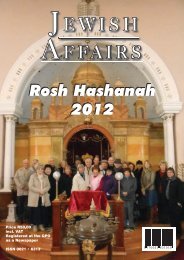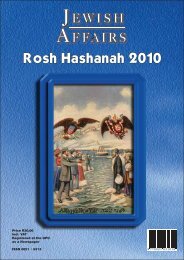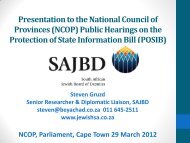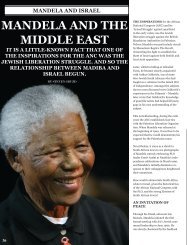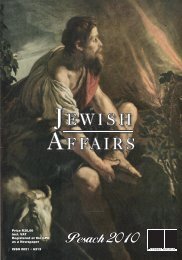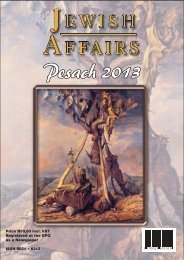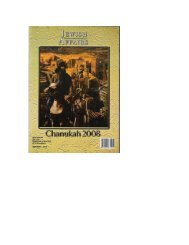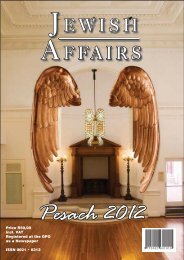Rosh Hashanah 2009 - South African Jewish Board of Deputies
Rosh Hashanah 2009 - South African Jewish Board of Deputies
Rosh Hashanah 2009 - South African Jewish Board of Deputies
- No tags were found...
Create successful ePaper yourself
Turn your PDF publications into a flip-book with our unique Google optimized e-Paper software.
JEWISH AFFAIRS ROSH HASHANAH <strong>2009</strong>accused <strong>of</strong> all sorts <strong>of</strong> things. On HIV/Aids, I believeit is a question <strong>of</strong> behaviour change, and values haveto be a part <strong>of</strong> it. You cannot get away from the factthat the epidemic is spread as a result <strong>of</strong> masspromiscuity and multiple partners, something manypeople are denying.It was the late Chief Rabbi Harris who said thatthere is a 100%-effective moral vaccine for Aids. Itry to bring a moral dimension to politics, and thiswhole ethos <strong>of</strong> ‘moral neutrality’ is wrong. I thinkthat we need to make judgments – we may be a multifaithand diverse country, but I do think that there areobjective standards and that we do need to makemoral judgements. I certainly haven’t steered clear<strong>of</strong> making value judgments, and that can be awkwardin a country which is diverse.What other important areas do you think youhave helped to bring to public attention?Well, I was the one who raised the whole issue <strong>of</strong>teenage pregnancies. I obtained the figures from theGauteng education department, and they reported aschool with over fifty pregnant students. Thatprovoked a huge public debate.That would tie in with the HIV/Aids question.Yes, because by definition teenage pregnanciesis unprotected sex. If the number <strong>of</strong> teenagepregnancies is large, that means there’s more highrisksex, so we should find out what’s going on inthese schools. It was quite pleasing to me [followingmy raising the issue] when I compared the relevantschools from one year to the next, and found thatbecause we had identified high-risk schools theywent in with a team and tried to improve things. Theschool that had had fifty pregnancies the one year didnot have the next, because some action was taken. Sothat’s one way <strong>of</strong> working as a politician - youexpose the information and affect debate that way.JA: You have been very active in countering anti-Israel propaganda and antisemitism in your privatecapacity. Has this impacted on you politically?JB: Pot-shots have certainly been taken at me inthe Legislature from time to time because I’m <strong>Jewish</strong>.The question <strong>of</strong> Israel will suddenly be raised, withoutany relevance to the topic at hand. Still, such incidentshave been few and far between.I must stress that I am a politician who happensto be <strong>Jewish</strong> and don’t represent Jews in my politicalcapacity. However, as a Jew I am very concernedabout antisemitism and anti-Zionism, and in myprivate capacity make available what expertise I can.The eye-opener for me was the 2001 WorldConference Against Racism in Durban, which Iattended and where I saw how minimal <strong>Jewish</strong>activism was. That conference exposed the lack <strong>of</strong><strong>Jewish</strong> preparedness very cruelly. Since then,fortunately, the community has built up impressiveresources in this area, websites such as Its AlmostSupernatural and the like.JA: You’ve authored three books to date. Couldyou tell us something about them?The first was called Black <strong>South</strong> <strong>African</strong>s’Disinvestment Dilemma (published by Jonathan Ball),which I saw as a treatise on political ethics – whatsort <strong>of</strong> means you employ to attain what ends. It wasadapted as a political ethics model and used by theWits Business School for a course on labour relations,and the balancing <strong>of</strong> means and ends. I interviewedblack trade unionists and asked if they felt it wasworth putting their members out <strong>of</strong> work to forcepolitical change. It was an acute ethical dilemma thatI found very interesting and which they had variousways <strong>of</strong> responding to.Out <strong>of</strong> Step (2005) was really something I neededto get out <strong>of</strong> my system. It’s part autobiography andpart presenting my views on a whole range <strong>of</strong> issues,including religion. 2The most recent book, Rising Tide – How freedomwith responsibility uplifts everyone [reviewed in thisissue], is a book <strong>of</strong> essays on a whole range <strong>of</strong> issues,many <strong>of</strong> which had been previously published (mostlyin the Citizen, where I am now writing a regularcolumn). It comprises a fair mix <strong>of</strong> articles, originallyemails that went out every Monday to senior mediapeople and key opinion-formers. Two <strong>of</strong> theseattracted a fair amount <strong>of</strong> public attention, werediscussed on Radio 702 amongst other things. Somewere ultra-topical at the time, others were reflective.I believe in the concept <strong>of</strong> liberty withresponsibility concept, “How Freedom WithResponsibility Uplifts Anyone” as the subtitle <strong>of</strong> mynew book has it. There are two common themes –freedom but also responsibilities – constraints.DS: It’s a very <strong>Jewish</strong> approach, really - the ideathat true freedom is bound up with self-restraint andthe acceptance upon oneself <strong>of</strong> certain obligationsand standards <strong>of</strong> behaviour.JB: Very <strong>of</strong>ten I put out <strong>Jewish</strong> concepts – Torahconcepts - without explicitly saying so and have beenamazed at how positively many people react to whatthey see as fresh ideas. In the beginning <strong>of</strong> RisingTide, I include the famous quote from Hillel – “If Iam not for myself, who will be for me? And if I amonly for myself, what am I? And if not now, when?”That has been a guiding light to me, and it summarisesmuch <strong>of</strong> the book. So what do you do with yourfreedom and is your freedom going to impinge onothers? It’s Pesach leading up to Shavuot – freedomfollowed by the acceptance upon the nation <strong>of</strong> certainresponsibilities.NOTES1 Andrew Feinstein, After The Party: A Personal and PoliticalJourney inside the ANC, Jonathan Ball, 20072 Reviewed in the Pesach 2006 issue <strong>of</strong> <strong>Jewish</strong> Affairs.6



